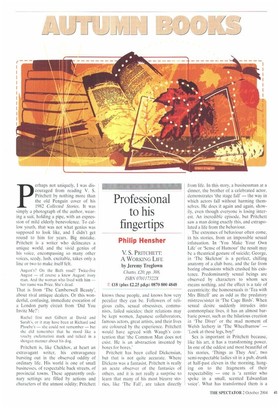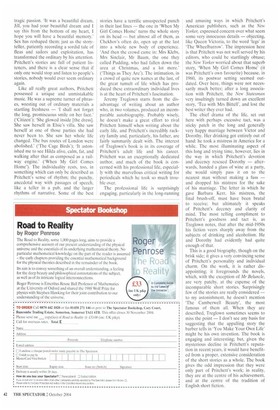Professional to his fingertips
Philip Hensher
VS. PRITCHETT: A WORKING LIFE by Jeremy Treglown
Chatto, .£20, pp. 308, ISBN 070117322X f18 (plus £1.25 p&p) 0870 800 4848 perhaps not uniquely, I was discouraged from reading V. S. Pritchett by nothing more than the old Penguin cover of his 1982 Collected Stories. It was simply a photograph of the author, wearing a suit, holding a pipe, with an expression of mild elderly benevolence. To callow youth, that was not what genius was supposed to look like, and I didn't get round to him for years. Big mistake. Pritchett is a writer who delineates a unique world, and the vivid genius of his voice, encompassing so many other voices, seedy, lush, excitable, takes only a line or two to make itself felt.
August's? On the Bath road? Twice-five August — of course a knew August: ivory man. And the woman who lived with him — her name was Price. She's dead.
That is from 'The Camberwell Beauty', about rival antique dealers. Or this wonderful, confusing, immediate evocation of a London party circuit from 'Did You Invite Me?':
Rachel first met Gilbert at David and Sarah's, or it may have been at Richard and Phoebe's — she could not remember — but she did remember that he stood like a touchy exclamation mark and talked in a shotgun manner about his dog.
Pritchett is, like Chekhov, at heart an extravagant writer, his extravagance bursting out in the observed oddity of ordinary life. His world is one of small businesses, of respectable back streets, of provincial towns. These apparently ordinary settings are filled by actions and characters of the utmost oddity; Pritchett
knows these people, and knows how very peculiar they can be. Followers of religious cults, sexual obsessive& communists, failed suicides; their relations may be kept women. Japanese collaborators, famous actors, great artists, and their lives are coloured by the experience. Pritchett would have agreed with Waugh's contention that 'the Common Man does not exist. He is an abstraction invented by bores for bores.'
Pritchett has been called Dickensian, but that is not quite accurate. Where Dickens was a fantasist, Pritchett is really an acute observer of the fantasies of others, and it is not really a surprise to learn that many of his most bizarre stories, like 'The Fall', are taken directly from life. In this story, a businessman at a dinner, the brother of a celebrated actor, demonstrates 'the stage fall' — the way in which actors fall without harming themselves. He does it again and again, showily, even though everyone is losing interest. An incredible episode. but Pritchett saw a man doing exactly this, and extrapolated a life from the behaviour.
The extremes of behaviour often come, in his stories, from an impossible sexual infatuation. In 'You Make Your Own Life' or 'Sense of Humour' the result may be a theatrical gesture of suicide; George, in 'The Skeleton' is a perfect, chilling anatomy of a club bore, and the far from boring obsessions which crushed his existence. Predominantly sexual beings are observed by characters to whom sex means nothing, and the effect is a tale of eccentricity: the homosexuals in 'Tea with Mrs Bittell' are as odd as the predatory mistress/sister in 'The Cage Birds'. When sexual desire suddenly intrudes into commonplace lives, it has an almost barbaric power, such as the hilarious erection in 'The Diver' or the mad moment of Welsh lechery in 'The Wheelbarrow' — 'Look at those legs, boy!'
Sex is important in Pritchett because, like his art, it has a transforming power. In one of the oddest and most beautiful of his stories, 'Things as They Are', two semi-respectable ladies sit in a pub, drunk at half-past eleven in the morning, hanging on to the fragments of their respectability — one is 'a rentier who spoke in a small, scented Edwardian voice'. What has transformed them is a
tragic passion. 'It was a beautiful dream, Jill, you had your beautiful dream and I say this from the bottom of my heart, I hope you will have a beautiful memory.' Sex has reshaped them; just as the storyteller, patiently recording a sordid tale of fleas and sailors and exploitation, has transformed the ordinary by his attention. Pritchett's stories are full of patient listeners, and there is a clear sense that if only one would stop and listen to people's stories, nobody would ever seem ordinary again.
Like all really great authors, Pritchett possessed a unique and unmistakable music. He was a supreme turner of phrases, wresting out of ordinary materials a startling freshness — 'I shall not forget the long, promiscuous smile on her face.' ('Citizen'); 'She glowed inside [the dress]. She saw herself in Elsie's villa. She saw herself at one of those parties she had never been to. She saw her whole life changed. The bus routes of London were abolished.' (The Cage Birds'); 'It astonished me to see Hilda alive, calm, fat, and walking after that as composed as a railway engine.' ('When My Girl Comes Home'). The individuality rests, too, in something which can only be described as Pritchett's sense of rhythm; the punchy, anecdotal way with passages of speech, like a teller in a pub, and the larger rhythms of narrative. Some of the best stories have a terrific unsuspected punch in their last lines — the one in 'When My Girl Comes Home' turns the whole story on its head — but almost all of them, as Chekhov's often do, open up at the last into a whole new body of experience. 'And then the crowd came in: Mrs Klebs, Mrs Sinclair, Mr Baum, the one they called Pudding, who had fallen down the area at Christmas, and a lot more.' (`Things as They Are'). The intimation, in a crowd of quite new names at the last, of the great tumult of life which has produced these extraordinary individual lives is at the heart of Pritchett's fascination.
Jeremy Treglown starts from the disadvantage of writing about an author who, in two volumes, produced an incomparable autobiography. Probably wisely, he doesn't make a great effort to rival Pritchett himself when writing about the early life, and Pritchett's incredibly rackety family and, particularly, his father, are fairly summarily dealt with. The interest of Treglown's book is in its coverage of Pritchett's adult life and his career. Pritchett was an exceptionally dedicated author, and much of the book is concerned with his professional life, especially with the marvellous critical writing for periodicals which he took so much trouble over.
The professional life is surprisingly engaging, particularly in the long-running and amusing ways in which Pritchett's American publishers, such as the New Yorker, expressed concern over what seem some very innocuous details — objecting, like Queen Victoria, to the word 'legs' in 'The Wheelbarrow'. The impression here is that Pritchett was not well served by his editors, who could be startlingly obtuse; the New Yorker worried about that superb story, 'When My Girl Comes Home' (it was Pritchett's own favourite) because, in 1960, its postwar setting seemed outdated. Over here, things were not necessarily much better; after a long association with Pritchett, the New Statesman very insultingly turned down an excellent story, 'Tea with Mrs Bittell', and lost the best writer they ever had.
The chief drama of the life, set out here with perhaps excessive tact, was a sticky patch in the long and generally very happy marriage between Victor and Dorothy. Her drinking got entirely out of hand: he took a mistress in America for a while. The most illuminating aspect of this long and trying time, however, lies in the way in which Pritchett's devotion and decency rescued Dorothy — afterwards, handed a glass of wine at a party, she would simply pass it on to the nearest man without making a fuss — and dropped his mistress for the sake of his marriage. The letter in which he gave Barbara Kerr, his mistress, the final brush-off, must have been brutal to receive; but ultimately it speaks of Pritchett's decency and clarity of mind. The most telling compliment to Pritchett's goodness and tact is, as Treglown notes, that after the mid-1950s his fiction veers sharply away from the subjects of drinking and alcoholism. He and Dorothy had evidently had quite enough of that.
This is a good biography, though on the brisk side; it gives a very convincing sense of Pritchett's personality and individual charm. On the work, it is rather disappointing; it foregrounds the novels, which, with the exception of Mr Belancle, are very patchy, at the expense of the incomparable short stories. Surprisingly few of the stories are really considered — to my astonishment, he doesn't mention 'The Camberwell Beauty', the most famous of them all. When they are described, Treglown sometimes seems to miss the point — I don't see any basis for suggesting that the appalling story the barber tells in 'You Make Your Own Life' might be his own invention. The book is engaging and interesting; but, given the mysterious decline in Pritchett's reputation in recent years, it would have benefited from a proper, extensive consideration of the short stories as a whole. The book gives the odd impression that they were only part of Pritchett's work; in reality, they are at the centre of his achievement, and at the centre of the tradition of English short fiction.



















































































 Previous page
Previous page